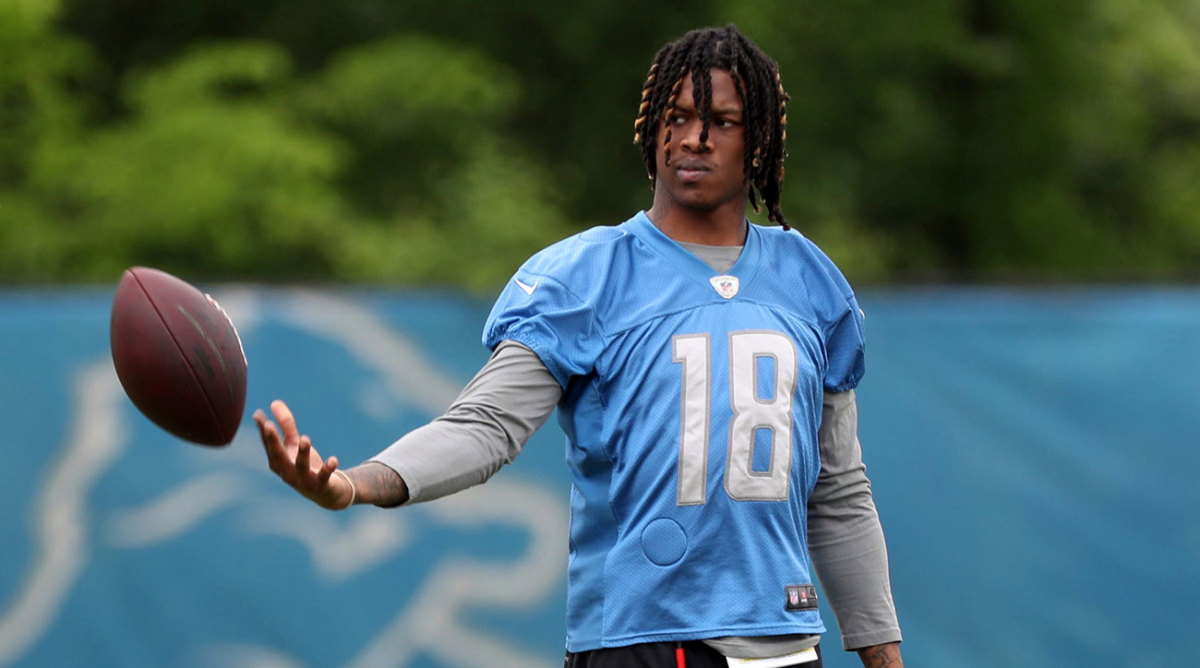Parts of the NFL’s Gambling Policy Take Things Too Far Against Offenders

The NFL has another situation on its hands stemming from players gambling, this one larger in size and scope than ever before. And here we have another argument about a league punishing its players for doing something it hopes every single one of us is doing in our spare time, as it assists the bottom line.
Is the punishment cruel, or is it merely hypocritical? The answer is complicated. Put as simply as possible: It depends on what the players bet on.
Friday’s news dump—which states that Lions WR Quintez Cephus and DB C.J. Moore, and Commanders DE Shaka Toney have been suspended indefinitely for betting on NFL games during the 2022 season—contains multitudes. The league also noted that Lions wide receivers Stanley Berryhill III and Jameson Williams have been suspended six games each for betting on non-NFL action while in a team setting.
For Cephus, Moore and Toney, what more evidence do you need that betting on NFL games while employed as an NFL player is not a worthwhile endeavor? This was already made clear when Calvin Ridley lost a year of his prime for the same action. Friday’s punishment announcement was not the NFL making a high-profile arrest to thump its chest. This was routine police work, with the penalties clearly marked on billboards all over town. Betting on an NFL game, even if the man who signs your checks spends his time yachting with the purveyors of DraftKings, is still an indefensible action. One of the greatest players in Major League Baseball history is still awaiting a trip to the Hall of Fame that may never come because of this. Pete Rose serves as a kind of anti-fairy tale, of which we should all know the lessons.

But for Williams and Berryhill, we start to wander into murky territory. During nearly every sporting event we are collectively spammed by commercials for in-game betting apps. The blitz of marketing is familiar to those who for years have heard Sam Elliott’s voice and felt the sudden pull to tap the Rockies. As much as gambling companies profess a desire for you to bet responsibly, they would sure love it if you emptied your wallet and poured out your life savings. They have focus groups, impact studies and trained experts who will sell you on the adrenaline rush that comes with winning a bet. They sell you on the idea that, yes, this American Athletic Conference men’s basketball tilt between two nontournament teams tipping off at 9:20 ET can be as thrilling as a night out in college if you throw $20 down.
And if you’re Williams or Berryhill, and you’re barraged constantly by these suggestions, wouldn’t it be easy to see how an innocent nonfootball bet out of boredom could come to be?
I’m sure NFL players are briefed on gambling. I’m sure they all have a copy of the gambling policy somewhere. I, too, have an employee handbook nestled deep in the recesses of my computer, but have I ever referenced it when downloading an app and providing my credit card out of some desperate attempt to fend off boredom? (Boy, I hope there’s no anti-Audible policy on books about the Antarctic.)
Watch the NFL with fuboTV. Start your free trial today.
We can say that these players were warned, but have you ever spent a day in an NFL facility? These coaches don’t even have enough time to get a player through a day of meetings, installations, treatment and film study. How many players are sticking around and mentally checked in for the nuances of a gambling policy that they probably assume is just, “Hey, Lions player, don’t bet on the freakin’ Lions.” How many of you are texting your bosses at 11:30 at night to make sure you can play a few hands of canasta?
Betting on non-NFL sports is where the gambling policy loses its teeth and turns from a league understandably trying to protect its brand to a league acting a bit dictatorial. NFL employees are banned from drinking alcohol in facilities, but could you imagine the league also banning it from the comfort of everyone’s own homes, while still raking in money from alcohol sponsorships? It lacks common sense and it’s asking its players to ignore the pull of the marketing that is paid for through a roped-in NFL audience.
We are a nation of bored people constantly tugged on by corporations offering us solutions to our boredom. For NFL players specifically, there are so many cottage industries set up to pry into their bank accounts and monetize their free time. For all we know, Williams and Berryhill were slogging through some endless cold tub session or finally enjoying a moment’s peace after a night spent away from their friends and families getting yelled at by desperate coordinators.
In that moment, when all that is available to you is a television and some benign game in a sport you don’t play in a league you don’t otherwise care about, when all you want to do is stuff the feeling of boredom back into the hole, they are humans like the rest of us. I’m still in favor of judging people the way I’d judge myself. The NFL should be, too.
